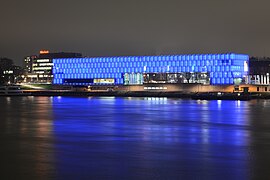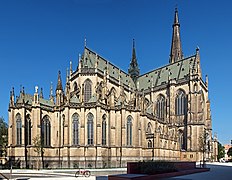Queering Wikipedia 2020/About Linz
Queering Wikipedia conference for May 2020 was cancelleddue to COVID-19 pandemic. |
| Queering Wikipedia |
Program | Fringe Events | Registration & Participants |
Location |
Logistics |
Contact |
Documentation, Reports, Reviews |
| Fringe Events | Budget |
About Linz
[edit]
Welcome to Linz!
Linz is the capital of Upper Austria. It has about 200.000 inhabitants and is located on the banks of the Danube.
Welcome to Austria!
The official language of Austria is German. Most people also speak English. Austria is ranked 14th of 189 countries at the 2018 Gender Inequality Index and 4th of 197 countries at the 2019 Gay Travel Index.
What to see in Linz
[edit]-
Baroque city centre
-
Ars Electronica Center
-
Klimt ...
-
and Schiele at Lentos
-
Lentos
-
New Cathedral
-
Tabakfabrik
Baroque city centre
[edit]The Baroque city centre is located around Hauptplatz (main square) and has many shopping and sightseeing options. Hauptplatz has been one of Europe’s largest urban squares since the 13th century.
→ Main Square Linz @ Linz Tourism Information
Ars Electronica Center
[edit]Ars Electronica Center is Linz’s “museum of the future”. Every September it hosts the Prix Ars Electronica, won by Wikipedia back in 2004.
| By showing your Queering Wikipedia conference badge at the museum ticket office you get free entry to Ars Electronica Center during the conference days. |
→ Ars Electronica Center @ Linz Tourism Information
Lentos
[edit]Lentos is a museum for modern and contemporary art, including works of Klimt, Schiele and Kokoschka. Its distinctive glass facade is a landmark next to the Danube.
→ Lentos @ Linz Tourism Information
New Cathedral
[edit]The Roman-Catholic New Cathedral is the largest church in Austria. It was built from 1862 to 1935 in the Gothic Revival style.
→ New Cathedral @ Linz Tourism Information
Tabakfabrik
[edit]Our venue Grand Garage is part of the Tabakfabrik (tobacco factory) which happens to be one of the most significant of the city’s many historic industrial buildings. The Tabakfabrik complex is used for a variety of contemporary arts and business purposes.









